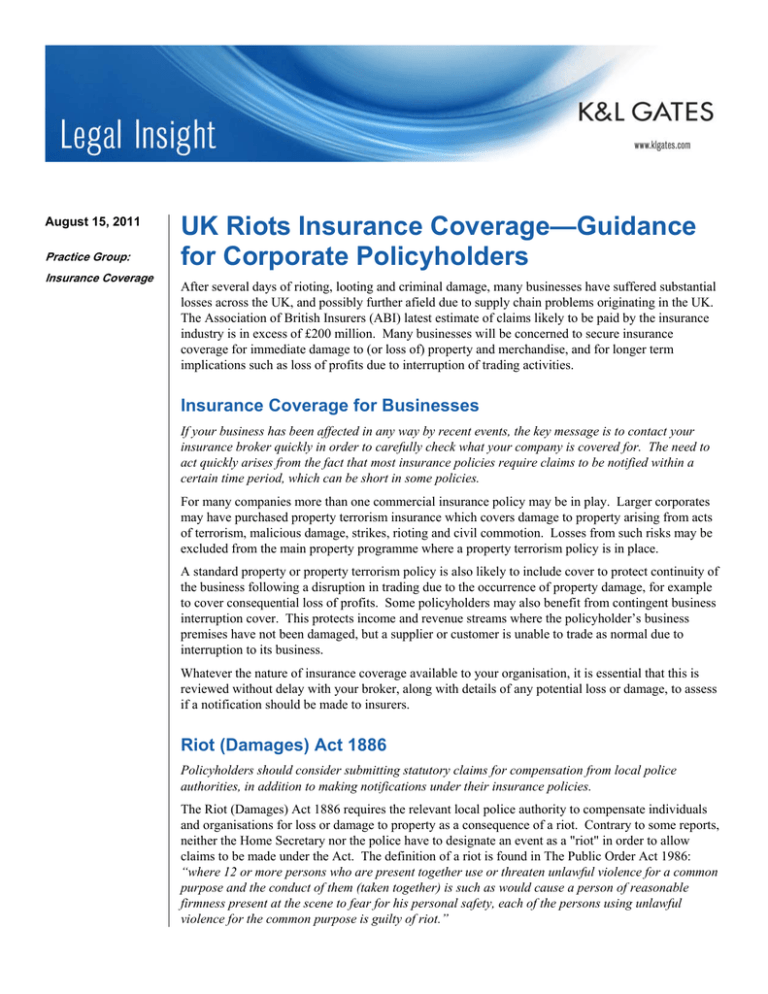UK Riots Insurance Coverage—Guidance for Corporate Policyholders
advertisement

August 15, 2011 Practice Group: Insurance Coverage UK Riots Insurance Coverage—Guidance for Corporate Policyholders After several days of rioting, looting and criminal damage, many businesses have suffered substantial losses across the UK, and possibly further afield due to supply chain problems originating in the UK. The Association of British Insurers (ABI) latest estimate of claims likely to be paid by the insurance industry is in excess of £200 million. Many businesses will be concerned to secure insurance coverage for immediate damage to (or loss of) property and merchandise, and for longer term implications such as loss of profits due to interruption of trading activities. Insurance Coverage for Businesses If your business has been affected in any way by recent events, the key message is to contact your insurance broker quickly in order to carefully check what your company is covered for. The need to act quickly arises from the fact that most insurance policies require claims to be notified within a certain time period, which can be short in some policies. For many companies more than one commercial insurance policy may be in play. Larger corporates may have purchased property terrorism insurance which covers damage to property arising from acts of terrorism, malicious damage, strikes, rioting and civil commotion. Losses from such risks may be excluded from the main property programme where a property terrorism policy is in place. A standard property or property terrorism policy is also likely to include cover to protect continuity of the business following a disruption in trading due to the occurrence of property damage, for example to cover consequential loss of profits. Some policyholders may also benefit from contingent business interruption cover. This protects income and revenue streams where the policyholder’s business premises have not been damaged, but a supplier or customer is unable to trade as normal due to interruption to its business. Whatever the nature of insurance coverage available to your organisation, it is essential that this is reviewed without delay with your broker, along with details of any potential loss or damage, to assess if a notification should be made to insurers. Riot (Damages) Act 1886 Policyholders should consider submitting statutory claims for compensation from local police authorities, in addition to making notifications under their insurance policies. The Riot (Damages) Act 1886 requires the relevant local police authority to compensate individuals and organisations for loss or damage to property as a consequence of a riot. Contrary to some reports, neither the Home Secretary nor the police have to designate an event as a "riot" in order to allow claims to be made under the Act. The definition of a riot is found in The Public Order Act 1986: “where 12 or more persons who are present together use or threaten unlawful violence for a common purpose and the conduct of them (taken together) is such as would cause a person of reasonable firmness present at the scene to fear for his personal safety, each of the persons using unlawful violence for the common purpose is guilty of riot.” UK Riots Insurance Coverage—Guidance for Corporate Policyholders The Act has attracted significant political and media attention in recent days. In a statement to Parliament on 11 August 2011, David Cameron encouraged homeowners and businesses to submit claims for compensation under the Act, adding that funds would be made available to meet compensation claims arising from the events of the past week. The Prime Minister also confirmed that the period to lodge such claims had been extended from the normal 12 days from the occurrence of damage, to 42 days. Compensation is not available under this statutory scheme in respect of consequential losses; only claims for theft or property damage may be accepted. Even if a policyholder has insurance coverage for theft or property damage, it would be advisable to submit a claim for compensation from the relevant police authority, in addition to notifying a claim under their insurance. This is because insurers are also entitled to compensation under the Act in respect of amounts paid under insurance policies on account of property damage. Moreover, the Act expressly provides (section 2(2)) that, where an insurer has paid under the policy and then recovers from the police authority, the “policy of insurance … shall continue in force as if the [insurer] had made no such payment” and thus the claims record of policyholders should be unaffected. To preserve the ability of insurers to claim compensation under the scheme in relation to amounts paid under insurance policies, it is important that the policyholder has submitted a claim under the Act in the first place. In response to the recent events, the Association of Police Authorities has published guidance on making a claim under the Act. This guidance can be found at www.direct.gov.uk/en/Nl1/Newsroom/DG_198958, as can a downloadable claim form. The claim form should be submitted to the relevant local police authority—for details, please refer to www.apa.police.uk/your-police-authority/contact-information. For businesses affected at multiple locations, we suggest that separate claim forms are submitted to each police authority in relation to premises which fall within the boundary of that authority. Authors: Frank Thompson frank.thompson@klgates.com +44.(0)20.7360.8183 Hussain S. Khan hussain.khan@klgates.com + +44.(0)20.7360.8181 Additional Contact: Jane Harte-Lovelace jane.harte-lovelace@klgates.com +44.(0)20.7360.8172 2 UK Riots Insurance Coverage—Guidance for Corporate Policyholders 3


